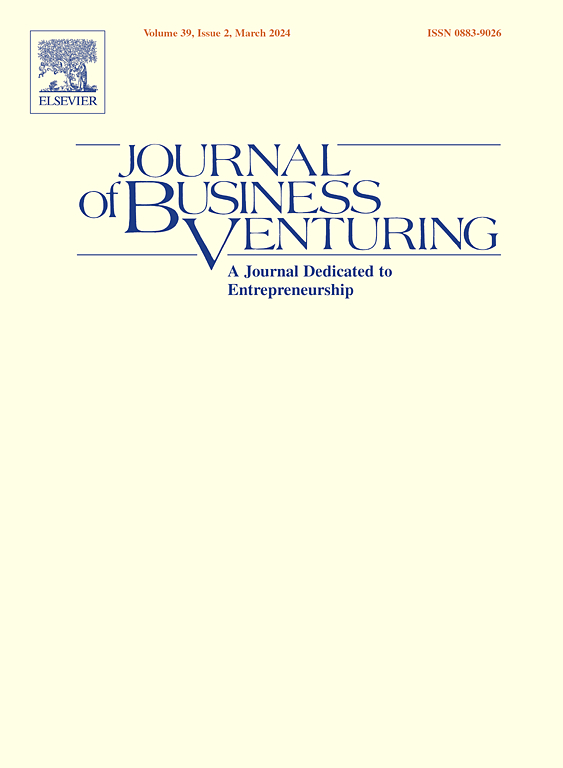Journal of Business Venturing 2024 year in review: The year of exercising entrepreneurial agency in response to crises
IF 8.9
1区 管理学
Q1 BUSINESS
引用次数: 0
Abstract
When various forms of crisis hit, they can stimulate changes in entrepreneurial agency – the capacity to act (or choose not to) – and the actions entrepreneurs take to mitigate the threats and pursue the new opportunities those crises create. While assessing articles for the Journal of Business Venturing's annual “Best Paper” award, we observed this to be a recurring theme across a significant number of the studies published in 2024. Inspired by this research, we summarize the 17 articles that explored this theme and develop a framework that highlights material, relational, and discursive concerns brought about by crises. In response entrepreneurs across individual or collective levels take action to preserve or cultivate distinct forms of entrepreneurial agency – adaptive, allied, and censored – and to resolve various paradoxes of entrepreneurial agency. We close with a brief discussion of the growing relevance of a social symbolic lens in reconciling how entrepreneurs construe and respond to crises and how the specific forms of agency and paradox identified could inform theory both within and beyond entrepreneurship.
Executive summary
This article began as a search for the “Best Paper” published in Journal of Business Venturing (JBV) in 2024. The editor-in-chief selected a panel of editors who then reviewed each of the 49 articles published in volume 39, issues 1–6, to identify those that were bold, broad, and rigorous. We arrived at a shortlist of five articles that best exemplified these criteria, from which the entire JBV editorial team voted for the winner: “Sight unseen: The visibility paradox of entrepreneurship in an informal economy,” by Robert Nason, Siddharth Vedula, Joel Bothello, Sophie Bacq, and Andrew Charman.
In addition to enabling the selection of a best paper, this process revealed a common theme cutting across more than one-third of the articles published throughout the year; namely, “how entrepreneurs exercise agency in response to crises.” Traditionally, crises have been defined as periods of turmoil that disrupt patterns of economic activities and represent acute potential threats to the livelihoods of those affected. Over the past decade, however, scholars (both within and outside the field of entrepreneurship) have gradually shifted attention from single, separate, and short-lasting episodes that momentarily disrupt entrepreneurial endeavors (Doern et al., 2016) to plural, entangled and long-lasting combinations, sometimes referred to as poly-crises (Klyver and McMullen, 2025). To consider both conceptualizations, we take a broader perspective of crisis, using the term holistically to include both acute and enduring widespread structural challenges. We reason that, by defying conformity and attempting actions that question a society's taken for granted assumptions about how the world works, entrepreneurs embody and enact a paradox of agency in which restrictions on their capacity to act – which dispirit, discourage, or even devastate most people – instead stimulate them to seek to preserve or cultivate their agency not only by mitigating the threats that crises can pose, but also by leveraging them as opportunities to improve their situation.
We proceed as follows. After a brief introduction, we summarize how each individual article reflects and contributes unique insights to the overarching theme of exercising entrepreneurial agency in response to crises. Grouping the articles according to the type of crisis examined, we sensitize ourselves to the underlying mechanisms that entrepreneurs use in response by adopting a social symbolic lens (Lawrence and Phillips, 2019). Specifically, we hone our attention to the relative importance and interplay of material, relational, and discursive dimensions of social symbolic work as entrepreneurs construe and respond to different types of crises. We suggest that entrepreneurs encounter various limitations to and paradoxes of agency that they seek to resolve by adapting, allying, or censoring their capacity to act. Finally, we conclude by articulating potential avenues for scholars to elaborate on this tri-dimensional approach to entrepreneurial agency both within and beyond entrepreneurship theory and practice.
《商业风险杂志》2024年回顾:运用企业家代理应对危机的一年
当各种形式的危机袭来时,它们可以刺激企业家能动性的变化——行动(或选择不行动)的能力——以及企业家为减轻威胁和追求这些危机创造的新机会而采取的行动。在评估《商业风险投资杂志》(Journal of Business ventures)年度“最佳论文”奖的文章时,我们发现,这是2024年发表的大量研究中反复出现的主题。受这项研究的启发,我们总结了17篇探讨这一主题的文章,并开发了一个框架,突出了危机带来的物质、关系和话语方面的关注。作为回应,个人或集体层面的企业家采取行动,保护或培养不同形式的企业家代理——适应性的、联合的和审查的——并解决企业家代理的各种悖论。最后,我们简要讨论了社会象征镜头在调和企业家如何解释和应对危机方面日益增长的相关性,以及确定的代理和悖论的特定形式如何为企业家精神内外的理论提供信息。
本文章由计算机程序翻译,如有差异,请以英文原文为准。
求助全文
约1分钟内获得全文
求助全文
来源期刊

Journal of Business Venturing
BUSINESS-
CiteScore
16.70
自引率
6.90%
发文量
59
审稿时长
77 days
期刊介绍:
The Journal of Business Venturing: Entrepreneurship, Entrepreneurial Finance, Innovation and Regional Development serves as a scholarly platform for the exchange of valuable insights, theories, narratives, and interpretations related to entrepreneurship and its implications.
With a focus on enriching the understanding of entrepreneurship in its various manifestations, the journal seeks to publish papers that (1) draw from the experiences of entrepreneurs, innovators, and their ecosystem; and (2) tackle issues relevant to scholars, educators, facilitators, and practitioners involved in entrepreneurship.
Embracing diversity in approach, methodology, and disciplinary perspective, the journal encourages contributions that contribute to the advancement of knowledge in entrepreneurship and its associated domains.
 求助内容:
求助内容: 应助结果提醒方式:
应助结果提醒方式:


